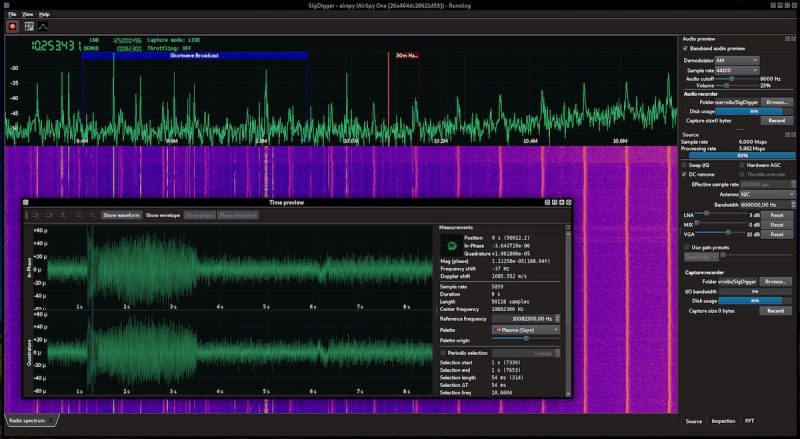 Many thanks to SWLing Post contributor, Ferrie, who recommends the SigDigger digital signal analyzer written by Gonzalo Carracedo (EA1IYR). According to the project’s Github page:
Many thanks to SWLing Post contributor, Ferrie, who recommends the SigDigger digital signal analyzer written by Gonzalo Carracedo (EA1IYR). According to the project’s Github page:
SigDigger is a graphical, digital signal analyzer I wrote in Qt5 for Unix systems like GNU/Linux or MacOS. Unlike existing alternatives, SigDigger is not based on GNU Radio. Instead, it uses its own DSP library (sigutils) and a realtime signal analysis library (Suscan) that exploits multicore CPUs to distribute load. Also, SigDigger supports most SDR devices in the market thanks to SoapySDR. Sigutils, Suscan and SigDigger are software libre, licensed under the terms of the General Public License version 3.
[…]SigDigger works in x86-64 CPUs running MacOS or GNU/Linux. In terms of performance, it can beat Gqrx by a factor of 20% (measured as saved CPU usage).
There are plans to port SigDigger to additional operating systems and architectures. Both Suscan and Sigutils have been successfully built and run in armhf Linuxes (i.e. Raspberry Pi) in the past, but official support is on its way.[…]
Current features
- MacOS & GNU/Linux support.
- Both realtime and replay analysis modes
- Analog mono audio playback (AM, FM, LSB and USB)
- Baseband recording (full spectrum and per-channel)
- Per-device gain presents
- Dynamic spectrum browsing
- ASK, FSK and PSK inspection
- Gradient-descent SNR calculation
- Different spectrum sources (cyclostarionary analysis, signal power…)
- Symbol recording and visualization
- Doppler analysis
- Filename-based raw file parameter guessing
- Transition analysis
- Interactive Panoramic Spectrum view
- Waveform inspection window, including burst detection and limited off-line demodulation support
- Signal source decimation
- Bandplan information
- Audio channel recorder
- Blind parameter estimation
- Network broadcast of demodulated channel
- UDP broadcast of received samples and demodulated symbols
- Spectrum integrator (for radioastronomy enthusiasts like me!)
Check out SigDigger’s Github page for full build instructions and pre-compiled binary release links.
Many thanks to Ferrie for the tip!
